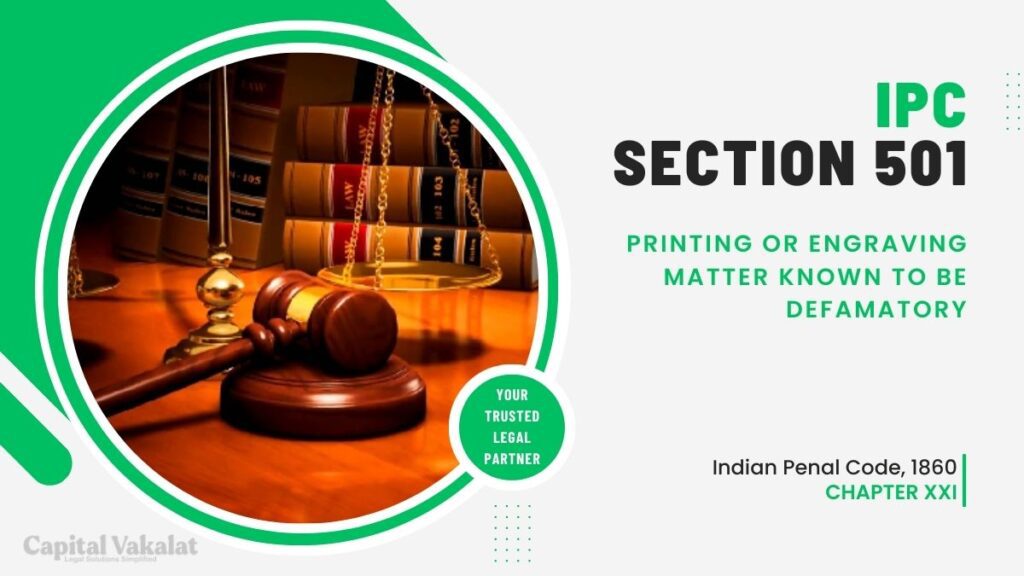In the intricate web of India’s legal framework, Section 501 of the Indian Penal Code (IPC) stands as a crucial element, specifically addressing the act of printing or engraving matter known to be defamatory.

Defamation, a concept deeply rooted in legal traditions, takes a distinctive form under Section 501 IPC, emphasizing the impact of words and images on an individual’s reputation.
Understanding Section 501 IPC
Section 501 IPC sheds light on the intricacies involved in printing or engraving material that is inherently defamatory. Defamation, in legal terms, refers to the act of harming the reputation of an individual or entity through false statements or representations. When such defamatory matter is intentionally printed or engraved, Section 501 comes into play, outlining the legal consequences of such actions.
Defamation and its Legal Implications
Defamation, a nuanced legal concept, encompasses false statements that harm the reputation of an individual or entity. It exists in various forms, including slander and libel. Slander refers to spoken defamatory statements, while libel involves written or printed defamatory material. Legal consequences for defamation can range from monetary damages to criminal charges, depending on the severity of the case.
Elements of Section 501 IPC
To better comprehend Section 501 IPC, it is essential to dissect its elements. The provision covers the act of printing or engraving, emphasizing the tangible nature of the defamatory matter. Moreover, the knowledge of the material being defamatory is a crucial element, requiring the prosecution to establish mens rea, the intent to cause harm.
Landmark Cases and Precedents
Over the years, several landmark cases have shaped the interpretation of Section 501 IPC. These cases provide insights into the legal nuances and help establish precedents for future judgments. Notable decisions by the judiciary have played a pivotal role in shaping the understanding of what constitutes defamatory matter and the mens rea required for prosecution.
Challenges in Enforcing Section 501 IPC
Enforcing Section 501 IPC poses several challenges, particularly in the dynamic digital age. Investigating cases involving printed or engraved defamatory matter requires a thorough understanding of the nuances involved. Proving mens rea in court adds another layer of complexity, especially when dealing with content disseminated through various online platforms.
Impact on Freedom of Expression
Balancing the scales between freedom of expression and defamation laws is a perpetual challenge. While Section 501 IPC aims to protect individuals from unwarranted harm, it is essential to navigate the fine line between preserving reputation and allowing the free flow of ideas. Debates surrounding the impact of defamation laws on freedom of expression continue to shape legal discourse.
Recent Amendments and Reforms
In response to the evolving nature of defamation in the digital era, legislative amendments and reforms have been introduced. These changes aim to address challenges posed by online platforms and the rapid dissemination of information. Government initiatives play a crucial role in adapting defamation laws to the ever-changing landscape of communication.
Best Practices for Avoiding Defamation
For journalists, writers, and content creators, understanding and adhering to best practices is vital in avoiding defamation claims. Responsible journalism and content creation not only protect individuals from legal consequences but also contribute to a healthier public discourse. Awareness of legal implications is paramount for publishers and writers alike.
Conclusion
In conclusion, Section 501 IPC serves as a significant pillar in India’s legal framework, addressing the specific act of printing or engraving matter known to be defamatory. Understanding the elements of this provision, exploring landmark cases, and acknowledging the challenges in its enforcement are crucial steps in comprehending the broader implications of defamation laws. Striking a balance between freedom of expression and protecting reputations remains an ongoing challenge, necessitating continual legal adaptation.
Frequently Asked Questions
How does the digital age impact defamation cases under Section 501 IPC?
The digital age poses challenges in investigating and prosecuting defamation cases, especially considering the rapid spread of information online.
What are the potential consequences of violating Section 501 IPC?
Consequences may include monetary damages, criminal charges, and reputational harm, depending on the severity of the violation.
Is there a difference between slander and libel under defamation laws?
Yes, slander involves spoken defamatory statements, while libel pertains to written or printed defamatory material.
Are there ongoing efforts to reform defamation laws in India?
Yes, legislative amendments and reforms are periodically introduced to address the challenges posed by evolving communication platforms.